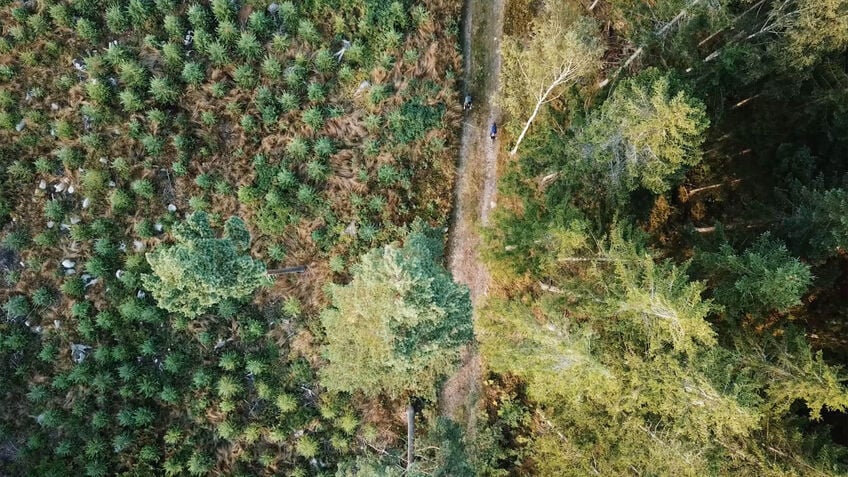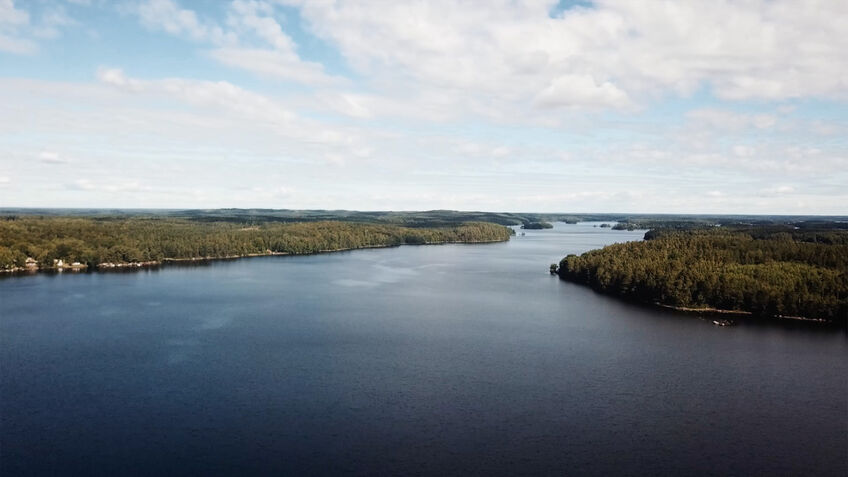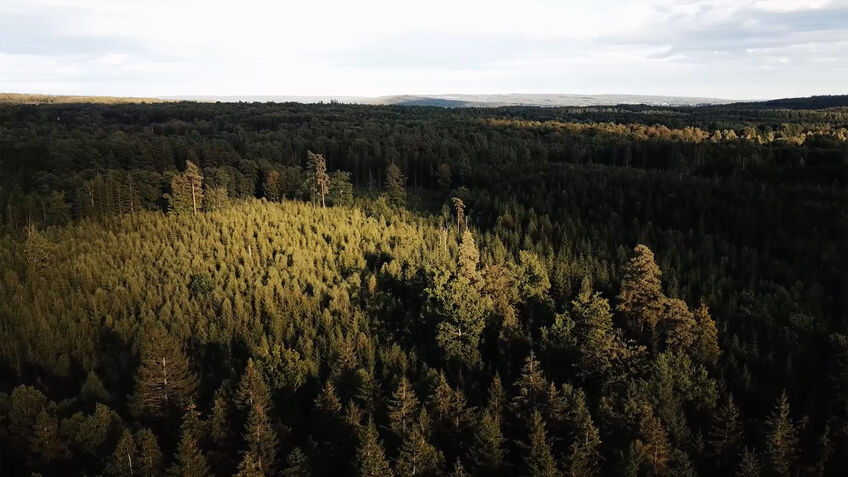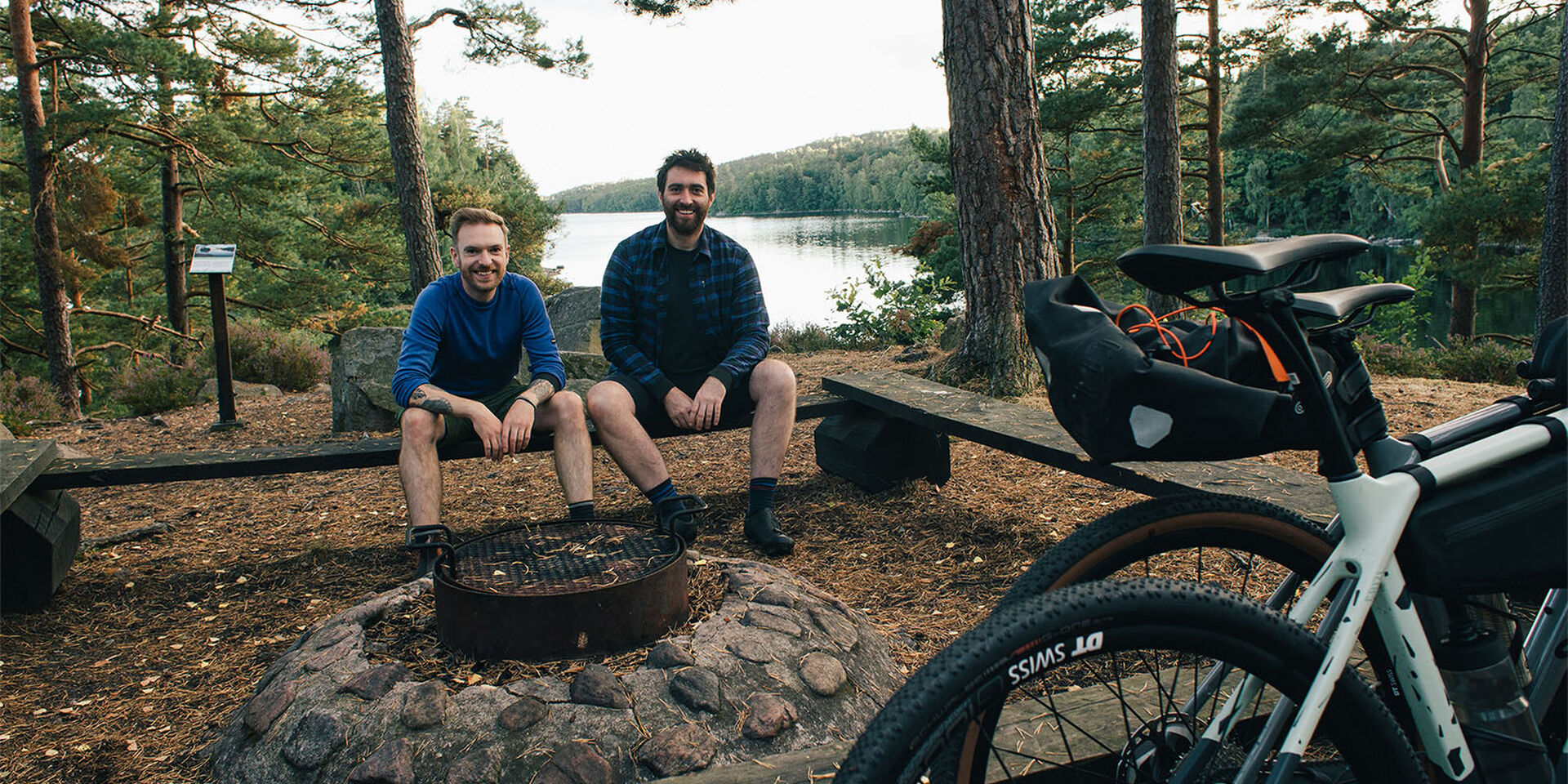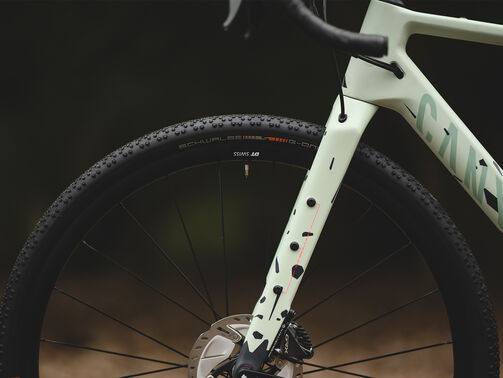Exploring Sweden by gravel bike
We gave outdoor adventurer Padraig Croke the chance to explore Sweden’s backcountry on a Canyon Grizl. Find out how he fared.
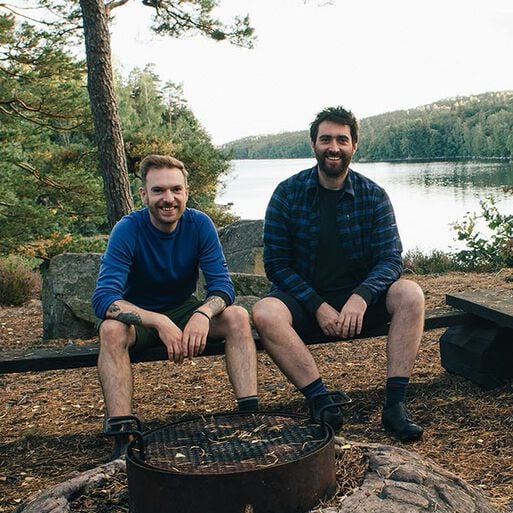
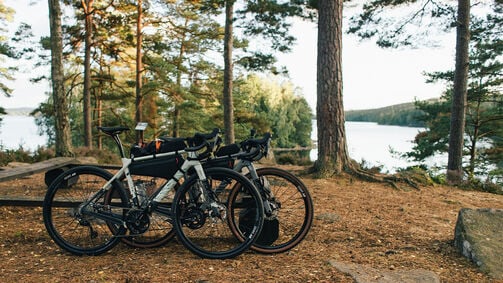
Over the last few years, I’ve gone through somewhat of a transitional period in my life professionally. From leaving my job as a graphic designer in Ireland in 2020, to moving to Sweden in search of a more enriching work/life balance, exploring the outdoors and using my professional skillset to work for me instead of someone else. This transition has found me spending a winter in the Arctic, living on a boat in southern Sweden, and now currently residing in Finland with my partner and my dog, enjoying the flow of Nordic simplicity. This summer past, I found myself once again in the South of Sweden, spending a week with an old college friend who I had not seen for a number of years, exploring the region of Skåne each of us on board a Canyon Grizl.
The Plan
Our destination was chosen for a number of reasons, namely for the fact that I knew the area well, having spent that year living on the boat while working for a friend at his canoe rental business – Immeln Canoe Centre. Also, George was now based in Berlin, and I in central Finland, it seemed the perfect middle point between the two of us. My plan was simply to hop on a train with my gravel bike fully loaded with camping kit, to the ferry port town of Turku on the west coast of Finland. From there I would take the ferry to Stockholm, followed by another train down to Skåne in the South for a week of adventure. Circumnavigating the lake of Immeln, camping, canoeing, exploring and of course plenty of cycling!
Going to Sweden meant taking advantage of Allemansrätten, the national freedom to roam laws giving everyone the right to camp, forage, cycle, swim, canoe and horse ride across almost the entirety of the land. Coupled with the fact that over 70% of the country is covered in forest means that Sweden is a gravel rider’s paradise. Thousands of kilometres of trails and forest paths that span the entire length and breadth of the country, just waiting to be explored.
Travelling to Sweden
It made sense that we get to the starting point as quickly as possible, giving us more days on the lake, rather than spending that time on travelling. However, like all good plans, nothing was as simple as it seemed. The first hurdle was when I discovered that on a lot of the Swedish train systems, you are not able to simply add a bike to your ticket like most other European countries. The bike has to be disassembled and stored in a bike bag! This simple pitfall essentially disabled my plan completely. I couldn’t just cycle to the train and ferries. Even if I could just assemble and disassemble the bike as I went, I would have the bike bag with me along with all my camping kit and recording equipment!*
And so, my romantic notion of stepping out my door and hitting the road was dashed unceremoniously by the logistics of reality. So how then to get to Sweden? Well…I simply lugged my bike bag with me, along with all my equipment and bikepacking bags on my back to the starting point. Without getting into too many details, it essentially took 3 days each way and involved trains, ferries, buses, ridiculously expensive taxi rides (my bike bag always needed an 8 seater), overnight hostels and a friend's couch along the way. Not advisable honestly… But I was determined to get there, and get there I did!
The meeting point
Eventually I made it to the start point, the small city of Kristianstad in the region of Skåne.
I assembled my bike in the park next to the station. The quick release wheels and simple assembly tool that came with the bike made the process a breeze, and within about 20 minutes I had assembled the bike and affixed my bikepacking bags.
My main setup was pretty simple, albeit a little too tight for the amount of kit we had with us. On each fork we had Canyon’s Fork cages holding light, yet bulky items like sleeping pads and extra clothing layers in 5 litre dry bags. Up front, where I kept my sleeping bag, I used an 8 litre Topeak frontloader and on the back I had a 16 litre saddle bag. This kept most of my heavier items like food, camping tools such as fire equipment, knife, headlamp, camera and batteries etc. I also had a small toptube bag for my phone and powerbank and the midloader kept easy to reach items like snacks, as well as our bike repair kits.
Admittedly this does sound like a good deal of space, but when you consider the fact that in just recording equipment alone I had a tripod, a drone, an SLR, an external microphone and extra batteries, and I was genuinely stuck for space many times.
I would advise anyone who plans to do extended outings with your Canyon Grizl, and you don’t have a support team or ultralight kit, to go for the Grizl AL, as this one allows for a rack to be mounted on the back of the bike and much more load capacity.
When George arrived, mercifully, he was able to help with the travel bag, removing the inner poles and flattening it down meant we could rig some straps to it and haul it on our back the 30km to the canoe centre. From here we could store it for the week while we cycled. We got in the saddle and rode into the night. A thunderstorm rolled to our north-east while we shouted to each other over the wind, getting a feel for how our paces would sync up for the next five days on the trail.
Sweden is a gravel rider’s paradise.
Padraig Croke
Unbound
Our trip played out in such an organic way that I could not have planned it even if I tried. I was determined not to focus on distance covered, or average speeds or anything like that. We were travelling within nature, and not simply through it. We were using our bikes to allow us to go further than just our legs might take us. We opted to use the canoe centre as a kind of basecamp, from which we could reconsolidate our kit and head out for a few days at a time, without having to carry absolutely everything with us at once.
Around the lake are a number of wooden huts and fire pits, which we used most nights of our trip. Having a hut meant that we didn't have to carry shelter systems with us such as tents or hammocks. Also, the fact that each hut had its own wood supply meant that we always had somewhere to cook our food and hang out. Most days began with coffee on the campfire using the still warm embers from the night before. Then we would pack up the bikes and decide which direction we would head that day, and what we would like to cook that night. Having the stores close by meant that we only needed to carry one day of food with us.
Our week was filled with food cooked over the open flames of a campfire, technical forest trails, downhill gravel and effortless cruising along smooth cycle paths. We canoed the lake and camped on the islands, all the while foraging ingredients for teas and food compliments. We heard wild boar, encountered roe deer and had a midnight encounter with a fox, bold and daring and clearly used to human interaction, coming into the glow of our campfire in an attempt to win a morsel of our charcoal cooked steaks. I wonder if half of these moments would have been lost, had we been focused on how many kilometres we covered, or how many we planned for the following day. I believe that slowing down and not worrying about those things, made for an entirely richer experience for both of us.
Final Thoughts
One thing that struck me, in hindsight, was both how important and how inconspicuous our bikes were on the trip. The Canyon Grizl seems effortlessly designed when you cycle it, with everything feeling exactly as a bike is supposed to under you. They say good design is invisible, and it’s only when something is badly designed do you notice it.
We could get into the technical specs and the numbers, but let's be honest with ourselves, when you’re gliding down a forest path or navigating a technical singletrack, or blazing across kilometres of farmland in the dark with a thunderstorm rolling in the distance, are you thinking about those numbers? No. You’re simply in that moment with your bike. A trusty tool that performs as it’s meant to.
No trail we faced seemed out of the question on the Grizl, and that invisible tool allowed for an interaction, both with our surroundings, and us as people. That would not have been possible without these exceptional tools under our feet being reliable and capable. The Grizl worked side by side with me to get what I wanted out of this adventure.
The Grizl worked side by side with me to get what I wanted out of this adventure
Padraig Croke
About the author
Padraig is a graphic designer, photographer, writer and podcaster from Ireland.
An avid outdoors and bushcraft enthusiast, he has spent the last number of years working in Scandinavia as a freelancer and running his podcast Trial by Fire, which interviews some of the world's leading experts in outdoor pursuits. You can find him on instagram @padraigcroke and the podcast @thetrialbyfirepodcast.
Did this article help?
Thank you for your feedback
-
 About the author
About the authorPadraig Croke
Padraig Croke is an Irish graphic designer, photographer, writer, and podcaster who is passionate about the outdoors and bushcraft. Based in Scandinavia, he hosts the Trial by Fire podcast, interviewing leading experts in outdoor pursuits.
